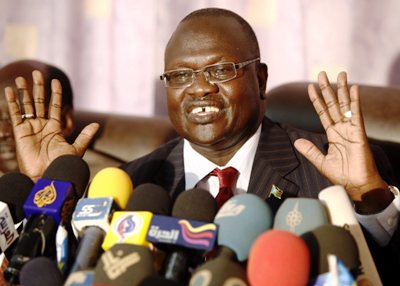S. Sudan rebel delegation in Addis Ababa for talks
By Tesfa-Alem Tekle
January 1, 2014 (ADDIS ABABA) – The South Sudanese government and a delegation from the group that rebelled last month are due to start peace talks in Ethiopia under a peace proposal brokered by other East African countries.

A delegation representing South Sudan’s former vice-president Riek Machar arrived in the capital, Addis Ababa late on Wednesday, sources told Sudan Tribune.
The group is believed to be led by Taban Deng Gai – the former Unity state governor who was sacked last year – and four other members. A further seven members of the rebel delegation is due to arrive on Thursday.
Machar, who served as the vice president of South Sudan from 2005 until he was sacked in July last year, had held up the peace process by refusing to hold face-to-face talks with President Salva Kiir.
The two sides confirmed they were sending a negotiating teams to Addis Ababa after Ethiopian foreign minister and chair of IGAD ministerial council, Tedros Adhanom travelled to South Sudan on Monday.
Peace talks are expected to open on Thursday as the South Sudanese government’s delegation had not arrived in Ethiopia by Wednesday evening. Juba said that is has appointed a 14-member delegation to attend the talks.
The delegation representing Kiir’s government is led by former foreign minister Nhial Deng Nhial, current information minister Michael Makuei and health minister Riek Gai Kok, as well as security officials including generals. They are expected to arrive in Addis Ababa on Thursday.
The South Sudanese leader is also sending opposition politicians with the delegation. Mediators told Sudan Tribune that the first step of the talks will focus on bringing about a ceasefire.
Machar, however, has so far insisted that his concerns need to be discussed before ceasefire can be implemented, arguing that mechanisms for monitoring the ceasefire need to be put in place. The body in charge of following up the implementation any deal must also be agreed, the former vice president has said.
President Kiir has accused Machar of attempting to stage a coup against him but this has been denied by all those involved, including the eleven senior members of the ruling SPLM who were detained soon after the fighting within the army began on the eveing of 15 December.
Reports that some people in capital Juba were attacked on the basis of their ethnicity led to significant parts of the South Sudanese army rebelling in Jonglei, Unity and Upper Nile states.
The United Nations says that at least 1,000 people are believed to have been killed and over 200,000 people displaced by the fighting which is continuing in some areas, although the capital, Juba, has been quiet for over two weeks.
However, Machar said on Wednesday that his forces are advancing Juba after recapturing Bor, the capital of Jonglei state. Bor was first captured by forces under Gen Peter Gadet who mutinied soon after the clashes in Juba but was retaken by the South Sudanese army (SPLA).
South Sudan’s government says it has sent thousands of troops to regain control of Bor amidst fears that the ongoing fighting could overshadow the Addis Ababa talks.
(ST)
